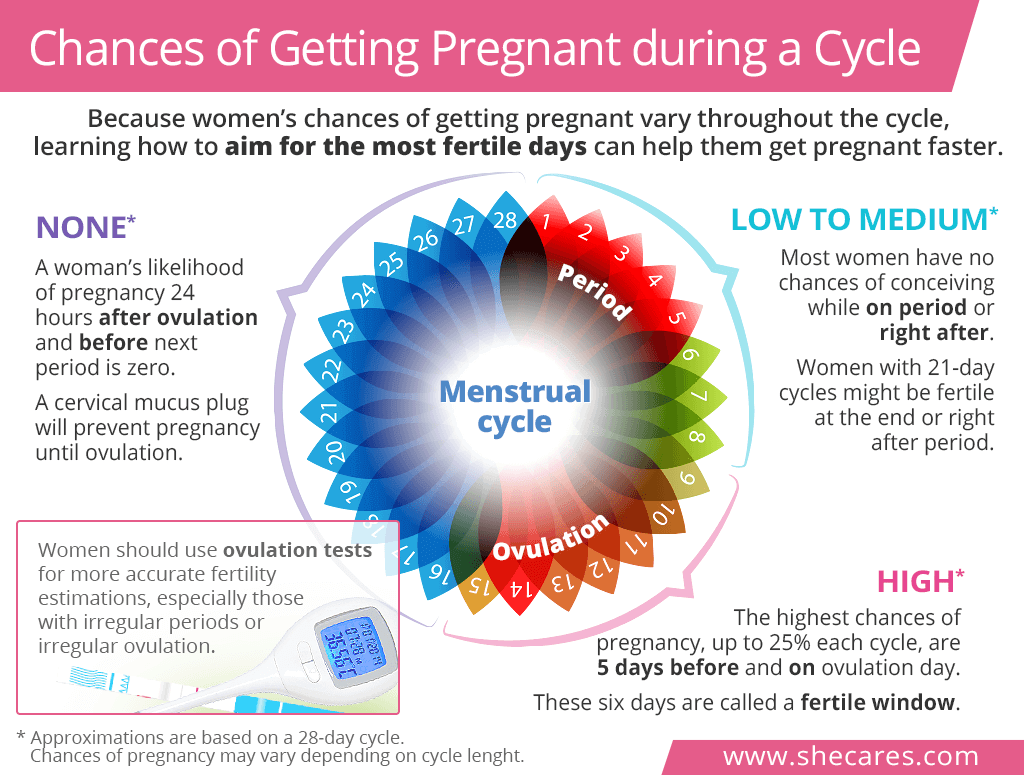Menstrual Cycle Overview
Before discussing specific chances of getting pregnant each month, it is worth refreshing the basics of a menstrual cycle.
A healthy menstrual cycle can last anywhere from 21 to 35 days with 28 days being the average. The break-up below applies to cycles that are 28 days. However, it is important to remember that menstrual patterns vary from woman to woman. It is broken up into the following phases:
Day 1 to 1: Follicular phase starts on the first day of a woman's period and lasts until ovulation.
Day 14: Ovulation, or egg release, occurs in between the two menstrual phases and lasts for up to 24 hours.
Day 15 to 28: Luteal phase lasts from ovulation until the first day of the next period.
Although the egg can only be fertilized during the 24 hours since its release, having unprotected sex during the fertile window, which extends three to five days before ovulation, can result in pregnancy. It is because the sperm can survive in the woman's body for several days, nourished by the cervical mucus. If present by the fallopian tube upon egg release, the sperm can fertilize it.
Chances of Getting Pregnant
Despite common believe, successful conception is not as easy as most couples think. Chances of getting pregnant depend on many other factors besides timely intercourse, including a woman's age, weight, and medical conditions as well as her partner's age, sperm health, or genetics.
As such, the highest chances of conceiving for a healthy couple of reproductive age are 25%. It is perfectly normal for partners to take 12 months of active trying to get pregnant, given a woman is younger than 35 years old. After 35, pregnancy chances greatly decrease and it might take longer to conceive.
Pregnancy Chances during Period: None to Low
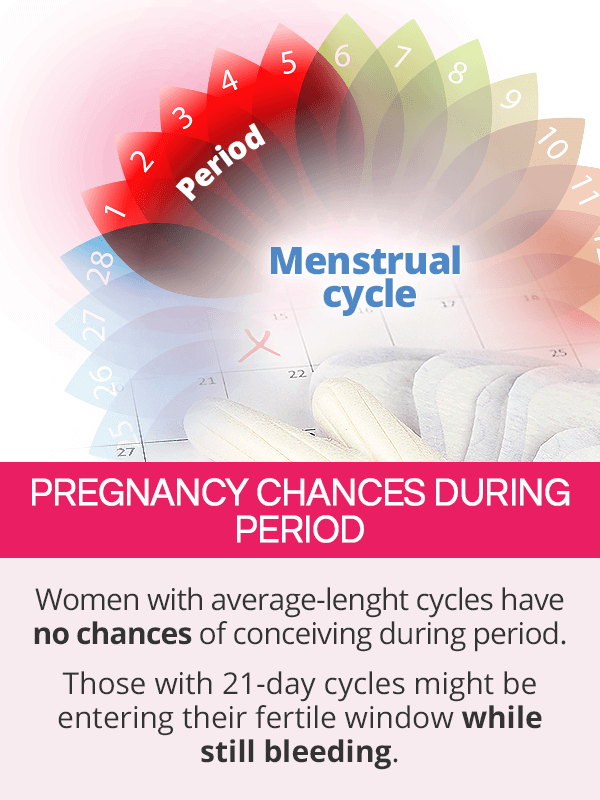
Chances of getting pregnant while on a period are nil for most women who have average-length cycles. However, those with shorter cycles might be nearing their fertile days while they are still bleeding.
Women with 28-day cycles start their fertile window around Day 9 with ovulation happening on Day 14. Having sex while menstruating (Days 1 to 5) will not result in pregnancy.
Women with long cycles, like 35 days, also have no chances of pregnancy on a period. Assuming they ovulate on day 21, their fertile window doesn't start until day 16. So, having sex while on a period will not help them conceive.
For women with short cycles, such as 21 days, it might be possible to get pregnant during a period. If they ovulate on Day 7, their fertile days can start when they are still spotting. Depositing the sperm during the fertile window can lead to pregnant.
Pregnancy Chances after Period and Before Ovulation: Low to High
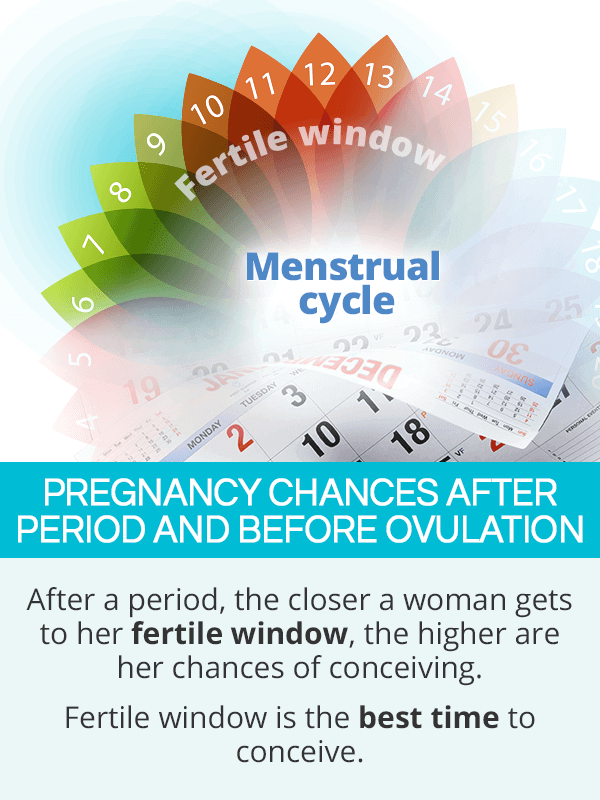
The likelihood of pregnancy increases with every day that passes following a period and hugely depend on the cycle length. The closer a woman gets to her fertile window, the higher are her chances of getting pregnant after period.
For women with 28-day cycles, chances of pregnancy right after period are very slim. However, because their fertile window is projected to begin on Day 9, having sex up to five days before ovulation is the best time to get pregnant.
For women with long cycles, it is generally safe to have sex after a period until Day 16, which is when their fertile days are expected to start. In those five days before ovulation, their chances of pregnancy are high.
Those with short cycles might already be in their fertile days when their period stops and before their ovulation takes place. Having sex in those days is very likely to lead to conception.
Pregnancy Chances during Ovulation: High
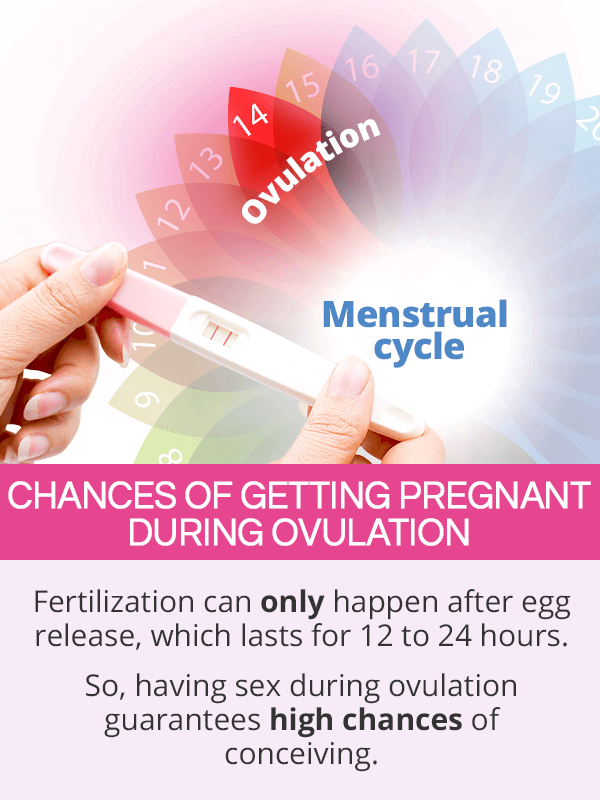
As aforementioned, fertilization of the egg by the sperm can only happen on ovulation, which lasts for 12 to 24 hours. So, a woman's chances of getting pregnant during ovulation are very high.
However, couples are advised against having sex only on the day of ovulation. It is because it takes time for the sperm to get through the reproductive tract to reach and penetrate the egg. With ovulation lasting only a limited time, it is easy to miss the opportunity within a given menstrual cycle.
Instead, studies have shown that partners have the highest odds of conceiving if they have sex every day or every other day during the fertile window and on the ovulation day. This way, there are plenty of sperm already present in the tract and awaiting egg release, which greatly increases the likelihood of successful conception.
Pregnancy Chances after Ovulation and Before Period: None
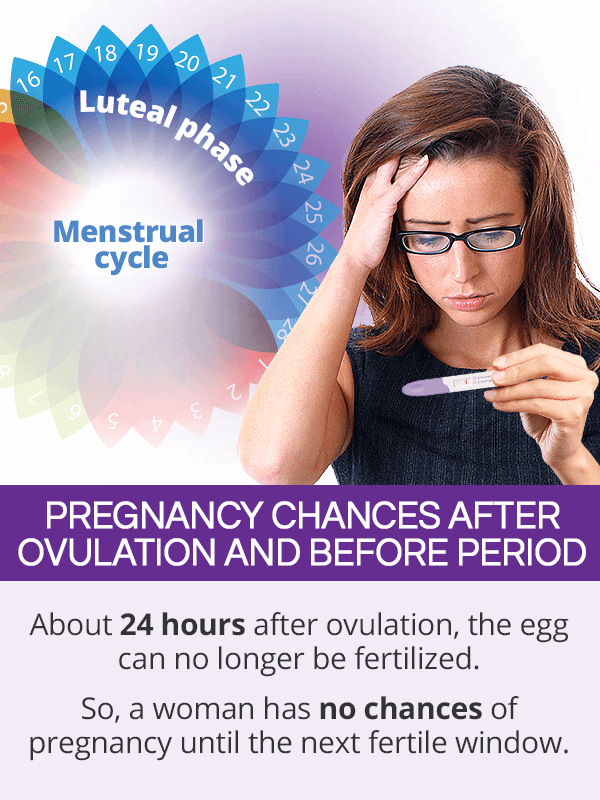
After 24 hours since the egg was released, it is no longer viable for fertilization. As such, a woman's chances of conceiving after ovulation and before period are zero.
When not fertilized, the egg will move down to the uterus to be disintegrated and shed during the next period about two weeks later. The rise in progesterone will change the consistency of cervical mucus and create a plug in the cervix to prevent the sperm from entering the uterus, essentially creating the body's own birth control method.
Conclusions
It is important to remember that because it is perfectly normal to experience slight shifts in menstrual patterns between the cycles, women should not merely rely on calendar calculations, especially those with irregular periods or irregular ovulation. Instead, the best way to assess one's chances of getting pregnant each month is by learning how to read the body's clues that fertile days are underway. This can be achieved with at-home ovulation tests, such as checking cervical mucus, measuring basal body temperature, or using ovulation test kits. Understanding what goes behind monthly menses is a valuable tool in aiming for most fertile days, thus maximizing a couple's conception efforts.
Sources
- British Medical Journal. (2000). The timing of the “fertile window” in the menstrual cycle: day specific estimates from a prospective study. Retrieved January 23, 2019 from https://www.ncbi.nlm.nih.gov/pmc/articles/PMC27529/
- Medline Plus. (2018). Pregnancy - Identifying fertile days. Retrieved January 23, 2019 from https://medlineplus.gov/ency/article/007015.htm
- Office on Women's Health. (n.d.). Trying to conceive. Retrieved January 23, 2019 from https://www.womenshealth.gov/pregnancy/you-get-pregnant/trying-conceive
- Your Fertility. (2018). Getting the timing right. Retrieved January 23, 2019 from https://www.yourfertility.org.au/everyone/timing
